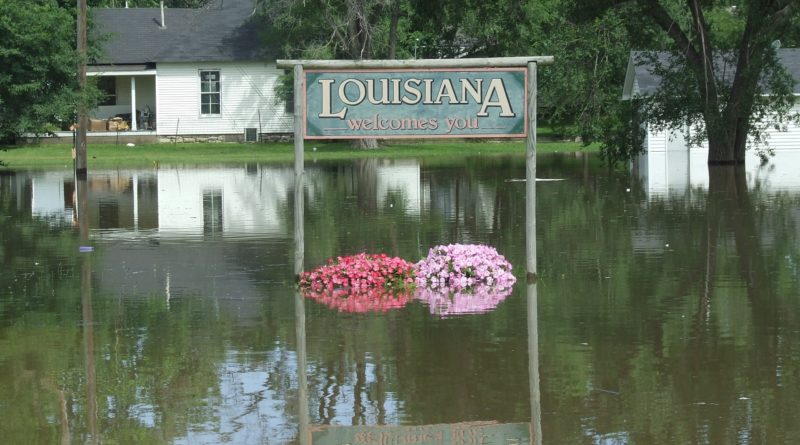Climate Change Under the Radar: The Louisiana Floods
Photo by eagle102.net/CC by 2.0
Article by Hannah Klaus
In the midst of the Summer Olympic Games and campaign for the fast approaching election, it is easy for other news items to be pushed under the radar. While many Americans cheered on Michael Phelps or Simon Biles and kept up with convention news from the comfort of their own homes, hundreds of thousands of Louisiana residents faced catastrophic flooding. From August 12th through 22nd, more than seven trillion gallons of water flooded southern Louisiana–three times greater than the floods during Hurricane Katrina (7).
During the storm, daily rainfall reached up to thirty inches a day and over eight rivers in the areas hit record flood levels (1).The floods have taken a serious toll on Louisiana residents. An estimated 146,000 homes were damaged (2). Over 20,000 people were rescued by the National Guard, coast guard, and civilians (10). Thousands fled to shelters (3). 13 people lost their lives (6).
Lousiana Governor, John Bell Edwards, declared a state of emergency on August 12th when the floodwaters were continuing to rise (8). President Obama declared parts of Louisiana as federal disaster areas (1). In the aftermath of the floods, the Federal Emergency Management Agency has approved more than $132 million in aid for flood victims (1).
The National Oceanic and Atmospheric Association (NOAA) stated the amount of rainfall that occurred when the floods were at their worst to be a 1 in 500 year event 5. In the past year, five other “500-year floods” have occurred 10. The extent to which this flooding event is a result of climate change has been a topic of debate. According to the National Climate Assessment, there was a 27% increase in daily rainfall events between 1958 and 2012. As the planet has warmed as a result of greenhouse gas emissions, there has been an increase in water vapor in the warmer air (4).
Although it can be difficult to point to a single weather event and blame climate change, recent research from the National Academy of Sciences has found that scientists can determine with some confidence that climate change is linked to some extreme weather events (9). Understanding the relationship between climate changes and extreme weather events such as this is crucial to prepare communities for future disasters to reduce their impact.
- “AIR Worldwide: Louisiana’s Record Rainfall Caused by Low-Pressure System.” Insurance Journal News. August 16, 2016. Accessed September 11, 2016. http://www.insurancejournal.com/news/southcentral/2016/08/16/423429.htm.
- Baton Rouge Area Chamber. Baton Rouge Area Chamber’s Economic Competitiveness and Business Intelligence Departments. “BRAC’s Preliminary Analysis of Potential Magnitude of Flooding’s Impact on the Baton Rouge Region.” News release. Accessed September 11, 2016. http://bloximages.newyork1.vip.townnews.com/theadvocate.com/content/tncms/assets/v3/editorial/8/b5/8b5eec1c-662d-11e6-ae3d-7b8d8a55b473/57b739d469a16.pdf.pdf.
- Hauser, Christine. “Louisiana Floods Lead to 8 Deaths.” The New York Times. August 15, 2016. Accessed September 11, 2016. http://www.nytimes.com/2016/08/16/us/louisiana-floods-deaths.html.
4. Liberto, Tom Di. “August 2016 Extreme Rain and Floods along the Gulf Coast | NOAA Climate.gov.” August 2016 Extreme Rain and Floods along the Gulf Coast | NOAA Climate.gov. August 19, 2016. Accessed September 11, 2016. https://www.climate.gov/news-features/event-tracker/august-2016-extreme-rain-and-floods-along-gulf-coast.
- “National Climate Assessment.” National Climate Assessment. Accessed September 11, 2016. http://nca2014.globalchange.gov/report/our-changing-climate/heavy-downpours-increasing#graphic-16692.
- Rhoden, Robert. “Where They Died: Interactive Map Shows Louisiana Flooding Victims.” NOLA.com. August 19, 2016. Accessed September 11, 2016. http://www.nola.com/weather/index.ssf/2016/08/la_flood_victims_black_and_whi.html.
- Samenow, Jason. “No-name Storm Dumped Three times as Much Rain in Louisiana as Hurricane Katrina.” Washington Post. August 19, 2016. Accessed September 11, 2016. https://www.washingtonpost.com/news/capital-weather-gang/wp/2016/08/19/no-name-storm-dumped-three-times-as-much-rain-in-louisiana-as-hurricane-katrina/.
- Slotkin, Jason. “Louisiana Governor Declares State Of Emergency As Floodwaters Rise.” NPR. August 12, 2016. Accessed September 11, 2016. http://www.npr.org/sections/thetwo-way/2016/08/12/489810274/louisiana-governor-declares-state-of-emergency-as-floodwaters-rise.
- Worland, Justin. “Scientists Are Making Stronger Links Between Climate Change and Extreme Weather.” Time. March 11, 2016. Accessed September 11, 2016. http://time.com/4255428/climate-change-extreme-weather/.
- Yan, Holly. “Louisiana’s Mammoth Flooding: By the Numbers.” CNN. August 22, 2016. Accessed September 11, 2016. http://www.cnn.com/2016/08/16/us/louisiana-flooding-by-the-numbers/.

